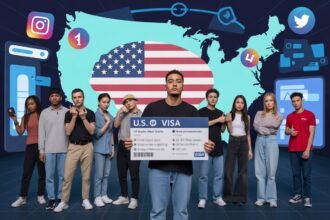For Nigerian students pursuing higher education in the United States on an F-1 visa, bringing their spouse and children along can be a crucial factor in their decision-making process. The F-2 visa is a dependent visa that allows family members of F-1 visa holders to accompany them while they study in the U.S. Understanding the application process, eligibility criteria, and requirements is essential to ensure a smooth transition for families.
This guide provides a comprehensive overview of the U.S. F-2 visa, detailing the application process, documentation, travel restrictions, work limitations, and practical tips for Nigerian students and their families.
Understanding the F-2 Visa
The F-2 visa is a non-immigrant visa designed for the dependents (spouses and unmarried children under 21) of F-1 visa holders. This visa allows family members to reside in the U.S. while the primary visa holder completes their studies. However, F-2 visa holders have restrictions compared to F-1 visa holders, particularly regarding employment and educational opportunities.
Eligibility for the F-2 Visa
To qualify for an F-2 visa, applicants must:
- Be the legal spouse or child (under 21 years) of an active F-1 visa holder.
- Have proof of a valid marriage certificate (for spouses) or birth certificate (for children).
- Show sufficient financial support to cover their stay in the U.S.
Key Benefits of the F-2 Visa
- Ability to live in the U.S. with the primary F-1 visa holder.
- Children can attend public or private elementary and secondary schools.
- No mandatory departure date as long as the F-1 visa remains valid.
- Can travel in and out of the U.S. as long as the visa is valid.
Limitations of the F-2 Visa
- Not eligible for employment in the U.S.
- Spouses cannot enroll in full-time academic programs but may take recreational courses.
- Cannot apply for Social Security Numbers (SSN) unless eligible for certain benefits.
Application Process for the F-2 Visa
The F-2 visa application process involves multiple steps, and Nigerian applicants must ensure that they follow the correct procedures for a successful visa approval.
Step 1: Obtain Form I-20 for F-2 Dependents
Before applying for an F-2 visa, the designated school official (DSO) at the F-1 visa holder’s institution must issue a separate Form I-20 (Certificate of Eligibility for Nonimmigrant Student Status) for each dependent. The F-1 visa holder must provide:
- Proof of their F-1 visa status.
- Evidence of sufficient financial resources.
- Marriage or birth certificates to confirm relationships.
Step 2: Pay the Required Fees
- SEVIS Fee: Unlike F-1 visa applicants, F-2 visa dependents are not required to pay the SEVIS fee.
- DS-160 Fee: Each applicant must complete the DS-160 visa application form and pay the non-refundable visa application fee (typically $160 per person).
Step 3: Schedule and Attend a Visa Interview
F-2 applicants must schedule a visa appointment at the U.S. Embassy or Consulate in Nigeria (Abuja or Lagos). The following documents must be presented:
- Valid passport (must be valid for at least six months beyond intended stay).
- Form I-20 issued for each dependent.
- Visa application confirmation (DS-160 form).
- Proof of financial support (bank statements, sponsor letters, or scholarships covering family expenses).
- F-1 visa holder’s documentation (visa copy, Form I-20, admission letter, and financial proof).
- Marriage or birth certificate (translated to English if necessary).
- Recent passport-sized photographs as per U.S. visa requirements.
Step 4: Attend the Visa Interview
During the visa interview, applicants must demonstrate strong ties to Nigeria and provide convincing evidence that they will return after the F-1 visa holder completes their studies. The consular officer may ask about:
- Intentions to stay in the U.S.
- Financial support for dependents.
- Relationship with the F-1 visa holder.
If approved, the visa will be stamped on the passport, and dependents can travel to the U.S. along with or after the F-1 visa holder.
Maintaining F-2 Visa Status
F-2 visa holders must comply with U.S. immigration regulations to maintain their status:
- Cannot work in the U.S. (volunteering is permitted in non-paid roles).
- Children can attend K-12 schools, but higher education is restricted to part-time courses.
- Must maintain a valid passport and visa.
- Cannot overstay beyond the F-1 visa holder’s permitted duration.
Renewing and Extending the F-2 Visa
If the F-1 visa holder extends their Form I-20 or academic program, dependents must update their Form I-20 accordingly. If an F-2 visa expires while in the U.S., dependents can remain as long as the F-1 status is active. However, visa renewal is required for re-entry into the U.S.
FAQ
1. How long does it take to process an F-2 visa for Nigerian applicants?
Visa processing times vary but generally take several weeks. Applicants should apply well in advance of their planned travel date.
2. Can an F-2 visa holder work in the U.S.?
No, F-2 visa holders are not allowed to work in the U.S. However, volunteering in non-compensated roles is permitted.
3. Can F-2 visa holders study in the U.S.?
- Spouses: Can only enroll in recreational or part-time courses.
- Children: Can attend primary and secondary schools (K-12) without restrictions.
4. Can an F-2 visa be converted to an F-1 visa?
Yes, an F-2 visa holder can change status to an F-1 visa if they receive admission to a U.S. institution and obtain a new Form I-20.
5. Can F-2 visa holders travel in and out of the U.S.?
Yes, but they must ensure their visa is valid. If the visa expires, they must renew it at a U.S. embassy before returning.
6. What happens if the F-1 visa holder loses status?
If the F-1 visa holder fails to maintain their status, all F-2 dependents will also lose their legal status in the U.S.
Conclusion
The F-2 visa plays a crucial role in allowing families of Nigerian students to stay together while studying in the U.S. Understanding the eligibility requirements, financial obligations, and travel limitations is essential for a smooth transition.
While the F-2 visa restricts employment and full-time education, it provides family members with a unique opportunity to experience life in the U.S. By carefully preparing for the application process and maintaining visa status, Nigerian families can successfully navigate their journey abroad.
For official information, visit:



